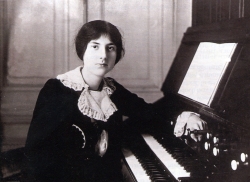Lili Boulanger
During the course of her short but prominent career, the composer Lili Boulanger (1893–1918) was an icon of the entrance of women into French professional society in the early part of the 20th century. The Boulanger family was something like musical aristocracy in 19th-century Paris. Lili Boulanger’s grandfather taught at the famed Paris Conservatory, and her father Ernest was a well-known opera composer in his time, as well as a winner of the prestigious Prix de Rome for composition — a competition also won by numerous other luminaries of the French classical-music world, including Hector Berlioz, Georges Bizet and Claude Debussy.

Lili Boulanger and her older sister Nadia both studied composition at the Paris Conservatory, a rare and notable undertaking for women at the time. In their careers, both sisters struggled against the constraints of gender expectations of the era. Nadia competed unsuccessfully for the Prix de Rome several times, but favoritism and noted misogyny of the judges thwarted her efforts. Lili later won the competition in 1913, the first woman to do so in the category of music composition. During the month-long competition and in subsequent press coverage, she took pains to present herself in a specifically feminine and non-threatening, even childlike, manner. This image, cultivated from the archetype of the femme fragile popular in art and literature of the time, would follow Boulanger through her short career, and be reinforced by music critics after her death in 1918 from complications of Crohn’s Disease.
The legacy of Lili Boulanger is intertwined deeply with her sister’s. Nadia herself gave up composing in 1922, but through her long career of teaching composition she
arguably shaped the future of classical music more than any single person during the 20th century. Nadia was directly responsible for the performance and publication of her younger sister’s compositions. She edited and occasionally transcribed manuscripts, and oversaw recordings of Lili’s music, sharing her sister’s work with the hundreds of composition students she taught until her death in 1979 — and with the larger public through annual concerts she organized in remembrance of Lili.
Lili Boulanger composed predominantly for voice or choir, either with piano accompaniment or full orchestra, and she preferred the combination of vocal and instrumental forces over writing for orchestra alone. In much the sam way that Mozart’s music is frequently described as “operatic,” Boulanger’s music has a decidedly vocal quality to it, even the instrumental pieces. Boulanger was devoutly Catholic, but notably interested in other religions and spiritualism in general. She frequently chose to set biblical or religiously oriented texts, as well as texts by French symbolist writers that reflect themes of sadness and loss, and the inexpressible mysteries of the universe and of the human soul. Her music is thus both intimate and immense, centered in the physical world but also transcendent of it.
Boulanger deftly employed avant-garde techniques to capture the ineffable qualities of religious rites through music in a way that few of her contemporaries did. Grounded in Catholic choral traditions, Boulanger often set text in a style similar to Gregorian chant, and her music always upholds the clarity of the words. Her musical language is comparable to Claude Debussy’s, through her preference for traditional church modes over major or minor scale tones, voices moving in parallel motion, unresolved chords, and frequently repeated melodic and rhythmic motives. Boulanger was a masterful orchestrator, combining vocal and instrumental lines to create ethereal and otherworldly tone colors. Her music never sounds atonal. Instead, she elicited a deeply felt religious sentiment, timeless and tinged with mysticism, a spiritual contrast to — and enhancement of — the symbolist aesthetic of her era.
The appeal of Boulanger’s music, 100 years after her death, is still manifest. Her compositions hint at different possibilities for the future of classical music, beyond the coldly rational rigors of serialism and atonality that reigned for much of the 20th century. Her musical evocations of spiritual anxiety and uncertainty speak to the disconnection and dissonance of our modern world as much as they resonated in the decade of the First World War. The scope of her compositions is remarkable, demonstrating substantial skill and insight beyond the 24 years she lived.
— Mary Moran
Mary Moran is author of The Choral Psalm Settings of Lili Boulanger: A Cultural and Historical Perspective of Psaumes 24, 129 and 130.
OSSCS will present the following works by Lili Boulanger over the course of the 2018–2019 season:
- Psalm 24 (“La terre appartient a l’Éternel”) [October 6]
- Pour les funérailles d’un soldat [November 3]
- Psalm 129 (“Ils m’ont assez opprimés dès ma jeunesse”) [February 9]
- Du fond de l’abîme [March 16]
- D’un matin de printemps [April 27]
Further reading and listening
- Composer of the Week: Lili Boulanger (BBC Radio 3)
- Centre National Nadia et Lili Boulanger
- The Lost Promise of Composer Lili Boulanger (Seattle Symphony)
- Lili Boulanger and the Prix de Rome (Untune the Sky)
- an analyis of the music of Lili Boulanger (Orchestration Online)
